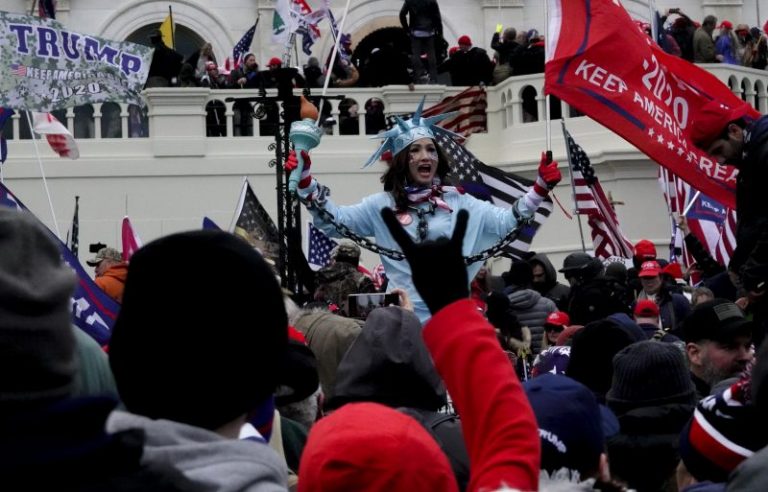Hundreds of prosecutions in the Jan. 6, 2021, Capitol riot were hanging in the balance as a panel of federal judges on Monday debated the constitutionality of the Justice Department’s lead felony charge.
D.C. Circuit judges will decide the scope of a felony obstruction charge members of Congress and a federal judge have suggested could be used to prosecute former president Donald Trump. Two of the three judges on the panel were appointed by Trump. The other was appointed by President Biden.
The law punishes “whoever corruptly alters, destroys, mutilates or conceals a record, document or other object … or otherwise obstructs, influences or impedes any official proceeding.” Prosecutors have used the charge against nearly 300 people they say intentionally tried to delay, prevent or block Congress from formally counting electoral votes as required on Jan. 6, such as by entering sensitive areas like the Senate chamber.
At a high-profile trial this fall, three members of the far-right Oath Keepers group were acquitted of engaging in a seditious conspiracy, which requires a plan to use force against the government, but convicted of obstructing an official proceeding. Four more Oath Keepers are starting trial this week; leaders in the Proud Boys face trial on similar charges in January.
The obstruction law was written in the wake of the Enron scandal, when the company’s accountants shredded potentially incriminating documents, an action not covered by the federal witness tampering statute. Defendants argue that the law is limited to interfering with the evidence in an investigation.
All but one District Court judge in D.C. to rule on the question has agreed with the government that the law can be read to include what happened on Jan. 6. That one, Judge Carl J. Nichols, however went further, ruling in March that the crime must involve “some action with respect to a document, record, or other object.”
The Justice Department appealed that ruling to the D.C. Circuit.
Judges Gregory Katsas and Justin Walker, both Trump appointees, suggested on Monday that the use of the word “corruptly” might be unconstitutionally broad, a question Nichols did not address.
“Why wouldn’t that pick up the person that’s just sitting in the gallery and starts shouting?” Katsas asked.
James Peace, representing the government, said that corrupt purpose isn’t being “watered down” to mean any disagreement, and a shouting protester is not trying to bring about an unlawful result.
But both judges were also skeptical of the arguments from defense attorney Nicholas Smith.
Smith represents Ethan Nordean, one of the Proud Boys defendants, and repeatedly argued that the government was engaging in an “injustice” that would turn political protest into a felony.
Walker pushed back, noting the violent rhetoric and actions around Jan. 6 — including one of the Proud Boys leaders saying, “This is war.”
“We’re not talking about a protest,” Walker said. “This was unprecedented. So it shouldn’t be surprising that there’s no precedent for a prosecution.”
Katsas questioned how Smith could say Nichols reached the right result from the language and context while simultaneously arguing that the law applies to evidence beyond documents. Smith acknowledged that multiple appellate courts have read the law more broadly than Nichols did.
“It seems like you’re taking … a less obvious textual gloss in order to avoid a lot of bad precedent for you,” Katsas said.
Smith said that what matters is that this law “has never been used” for “actions unrelated to evidence.”
Judge Florence Pan, a Biden appointee, repeatedly said there was nothing in the text or other court rulings that limit the law as Nichols and Smith see it.
“I’m still not seeing where in the text it says evidence impairment,” she said. “If you’re just relying on the words — impeding, influencing, et cetera — why wouldn’t it be everything?”
The government has argued that even under Nichols’s interpretation their obstruction cases could survive, because the ballots that were being confirmed on Jan. 6 were documents proving Biden’s victory.
Smith disputed that, saying “ballots do not constitute evidence.”
While federal advisory guidelines for first offenders are far lower, the obstruction of a congressional proceeding charge is punishable by a maximum sentence of 20 years, the same as seditious conspiracy or assaulting a police officer. That has allowed prosecutors to levy a severe charge against defendants whose offenses involves conduct they allege was criminally egregious but not explicitly violent.
Defense lawyers and legal analysts say the charge has been significant in the prosecution of members of extremist groups such as the Proud Boys or Oath Keepers alleged to have planned and prepared for violence, but who otherwise might face only rioting charges punishable by a maximum of five years if they did not actually attack anyone or damage anything.
The defendant for whom Nichols threw out the obstruction charge, Garrett Miller, has pleaded guilty to five other felony counts and six misdemeanors in the past week. The felony offenses include three charges of impeding police in a riot, assaulting a police officer inside the Capitol and threatening Rep. Alexandria Ocasio-Cortez (D-N.Y.) after she called for Trump’s impeachment that evening by tweeting “assassinate AOC.”
“I intended the comment to be perceived as a serious intent to commit violence against the congresswoman,” Miller said in plea papers and confirmed in a court hearing cutting short a bench trial. He has already spent two years behind bars on pretrial detention.

